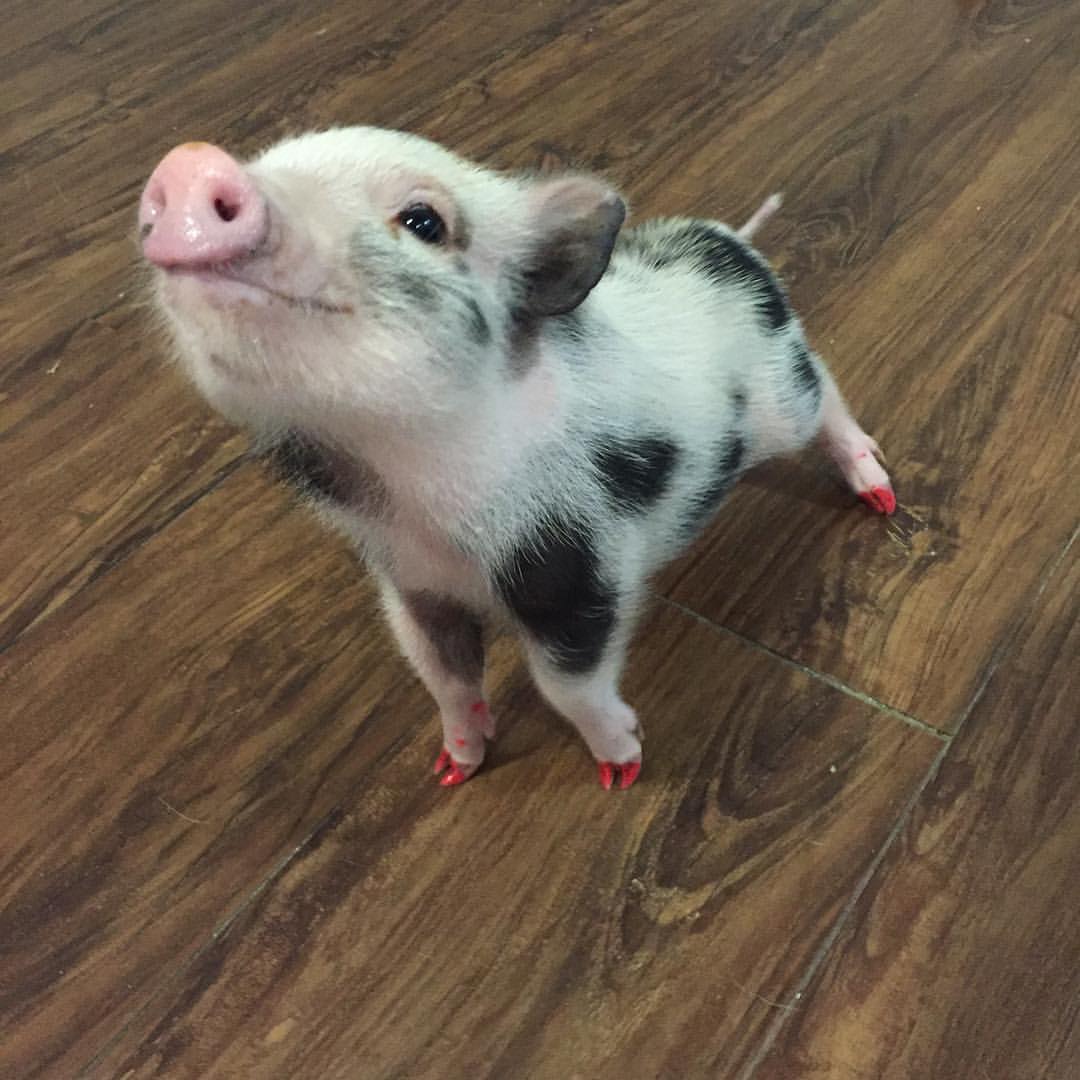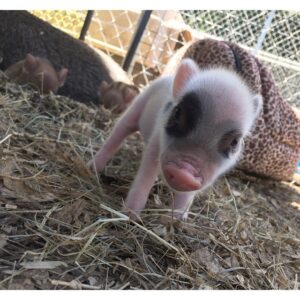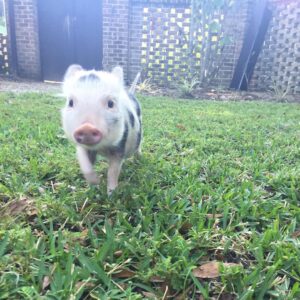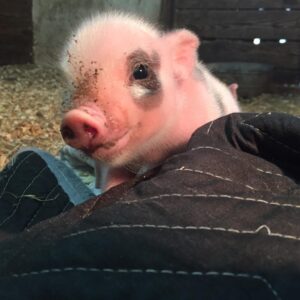Description
1. Introduction
Pot belly pigs are unique pets that have gained popularity due to their intelligence, friendly nature, and compact size. This article provides a comprehensive guide on where to buy a pot belly pig near you, what to consider before purchasing, and how to care for them effectively. If you’ve been thinking of adding a pot belly pig to your family, this guide will walk you through the essential steps.
2. What is a Pot Belly Pig?
Pot belly pigs are small, domesticated pigs that originated from Vietnam. They have a distinctive appearance, with a rounded belly, short legs, and a sleek body. Typically weighing between 100 and 150 pounds, pot belly pigs are known for being clean, easy to train, and relatively low-maintenance compared to other pets.
3. History of Pot Belly Pigs
The history of pot belly pigs as pets began in the 1980s when they were introduced to the United States. Initially seen as exotic pets, their popularity grew due to their manageable size, intelligence, and compatibility with domestic environments.
4. Legal Considerations for Owning a Pot Belly Pig
Before purchasing a pot belly pig, it’s crucial to check local regulations. Some cities or counties may have restrictions on owning pigs as pets, while others may require specific permits or zoning allowances. Always ensure compliance with local laws to avoid potential issues.
5. Benefits of Having a Pot Belly Pig as a Pet
Pot belly pigs are affectionate, social animals that form strong bonds with their owners. They are highly intelligent and can be trained to perform various tasks, much like dogs. Pot belly pigs are also relatively hypoallergenic, making them suitable for people with allergies.
6. Where to Buy a Pot Belly Pig Near You
6.1 Local Breeders
Local breeders are a common source for purchasing pot belly pigs. These breeders specialize in raising pot belly piglets, ensuring they are healthy and well-socialized before adoption. Always visit the breeder’s facilities to assess the living conditions and health of the animals.
6.2 Animal Shelters and Rescue Centers
Many pot belly pigs end up in animal shelters or rescue centers due to owners being unprepared for their care. Adopting from a shelter can be a rewarding experience, giving a pig a second chance at life while also reducing overpopulation.
6.3 Online Classifieds and Marketplaces
Websites like Craigslist, Facebook Marketplace, and other online platforms offer listings for
. However, be cautious when buying through online classifieds to ensure the legitimacy of the seller and the health of the pig.
6.4 Specialty Pot Belly Pig Farms
Specialty farms dedicated to breeding pot belly pigs may offer healthier, well-cared-for animals. These farms usually have extensive knowledge about pot belly pig care, ensuring that buyers receive pigs in excellent condition.
7. Questions to Ask Before Buying a Pot Belly Pig
7.1 Health and Vaccination Records
Ensure the piglet you are buying has up-to-date health and vaccination records. This ensures the pig is free of diseases and provides a clear history of its medical care.
7.2 Piglet’s Age and Temperament
Check the age and temperament of the piglet. Younger pigs are easier to train and socialize, while their temperament can give insights into their future behavior.
7.3 Breeder’s Reputation
Investigate the breeder’s reputation by reading reviews or asking for references. A reputable breeder is essential for ensuring the pig’s health and upbringing.
8. Cost of Owning a Pot Belly Pig
8.1 Purchase Costs
The cost of purchasing a pot belly pig ranges from $100 to $500, depending on the breeder and location.
8.2 Ongoing Expenses (Vet care, Food, Habitat)
Ongoing expenses include veterinary care, food, and suitable habitat. Pot belly pigs require high-quality pig feed, routine vet visits, and a well-maintained living environment.
9. Preparing Your Home for a Pot Belly Pig
9.1 Indoor Living Environment
Pot belly pigs can live indoors, but you’ll need to pig-proof your home by removing hazards and providing space for them to roam.
9.2 Outdoor Space Requirements
If you have outdoor space, ensure that your yard is secure and offers enough room for your pig to exercise and play.
9.3 Potty Training a Pot Belly Pig
Potty training a pot belly pig can take time, but they are quick learners. Using a consistent training method will help your pig understand where and when to relieve itself.
10. Pot Belly Pig Health and Nutrition
10.1 Common Health Issues
Common health issues for pot belly pigs include obesity, arthritis, and respiratory problems. Regular vet checkups can help monitor their health and prevent complications.
10.2 Nutritional Needs
A balanced diet is essential for a pot belly pig’s health. Their diet should include vegetables, fruits, and high-quality pig feed.
11. Training and Socialization of Pot Belly Pigs
Pot belly pigs are highly trainable and social animals. With positive reinforcement and consistency, they can learn commands, tricks, and even use a litter box.
12. Expert Insights on Pot Belly Pig Ownership
Experts recommend that potential owners fully understand the commitment required to care for a pot belly pig. Their intelligence and sociability make them rewarding pets, but they require significant time and attention.
13. Trends in Pot Belly Pig Ownership
In recent years, pot belly pigs have become trendy pets, especially among celebrities and influencers. This trend has raised awareness about the benefits and challenges of owning these unique animals.
14. Conclusion
Pot belly pigs can make excellent pets for the right person. Before purchasing, ensure you have the space, time, and resources to care for them properly. With the right care, pot belly pigs can be loving and loyal companions for years to come.
15. FAQs about Pot Belly Where can i buy a pot belly pig near me
Q: How long do pot belly pigs live?
A: Pot belly pigs can live up to 15-20 years with proper care.
Q: Are pot belly pigs good with children?
A: Yes, they are generally good with children but should always be supervised to ensure both the pig and the children interact safely.
Q: Can pot belly pigs live indoors?
A: Yes, pot belly pigs can live indoors, but they require ample space and training to adapt to indoor environments.
Sure! Here’s the continuation of the article with additional FAQs:
15. FAQs about Pot Belly Pigs (Continued)
Q: What do pot belly pigs eat?
A: Pot belly pigs have a diverse diet. They typically eat commercial pig pellets, fresh vegetables, fruits, and some grains. It’s important to avoid feeding them junk food or anything high in sugar or salt, as this can lead to obesity and other health issues.
Q: How big do pot belly pigs get?
A: Pot belly pigs typically grow to be between 100 and 150 pounds, though some may weigh more depending on diet and genetics. Their compact size, relative to other pig breeds, makes them suitable for domestic environments, but it’s still essential to have enough space for them to move around comfortably.
Q: Do pot belly pigs need regular veterinary care?
A: Yes, like any other pet, pot belly pigs require regular vet visits. They need vaccinations, regular check-ups, and preventive care for common issues such as parasites or infections. It’s also important to monitor their weight to prevent obesity-related health problems.
Q: Are pot belly pigs noisy?
A: Pot belly pigs can be vocal, but they are generally quieter than dogs. They may grunt, squeal, or snort, especially when they are excited, hungry, or seeking attention. However, with proper training and care, their noise levels can be manageable for most households.
Q: Can pot belly pigs live with other pets?
A: Pot belly pigs can cohabit with other pets, especially if introduced early. However, interactions with dogs should be supervised closely, as some dogs have a strong prey drive. With proper socialization, pot belly pigs can get along with cats and other non-aggressive animals.
Q: How do you know if a pot belly pig is happy?
A: A happy pot belly pig will display playful and social behavior, such as wagging its tail, following its owner, and






Reviews
There are no reviews yet.